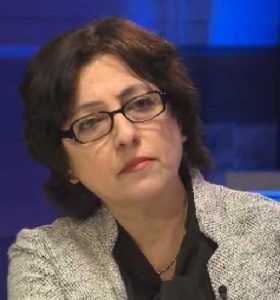By Elahe Boghrat
Editor-in-Chief, Kayhan London

The interconnected global technological environment, better known as cyberspace, provides a viable vehicle for the computer-literate and educated segments of society to express their social, political and cultural views, particularly in countries such as Iran where authorities try to limit or completely block public access to the internet and social media. This virtual environment is also used by state-sponsored “cyber armies” to hack other governments’ systems and disseminate false information.
Research has shown that while people on Instagram tend to highlight cultural issues, those using Facebook are more inclined to exchange social and political views. However, Twitter users are arguably the most partisan group, promoting specific political agendas. Politicians, government officials, and activists are very active on Twitter. Those keen on social media have their particular followers.
We should, however, view all surveys carried out on Twitter with a dose of healthy scepticism, given that even the data collected by prestigious research centers and polling organizations in the past few years in developed countries somewhat differs and even in some cases completely contradicts real public sentiment. For instance, the fact that Iranian society is very political doesn’t necessarily mean that people seriously discuss political issues online. There is no definitive data on the number of people whose primary reason for using the internet is to exchange views on social and political issues.
Most research into the humanities revolves around a few sets of theories, premises or beliefs. For instance, a survey carried out among 1,000 people on their preferred radio transmission is designed in such a way as to guide them towards a particular final answer. While the participants can, at any time, stop the survey, they are not able to offer alternative responses to the ones presented to them. Studies conducted on Twitter are no exception to this rule. They revolve around the researchers’ specific set of theories and predictions. The designers of a survey have, in all likelihood, anticipated all possible answers to a question.
I raised three questions in October which centered around two principal issues, namely, what roles do self-interest and also subjective political views play in a person’s responses in a survey? For instance, do the so-called pro-democracy advocates who participate in an online study factor in the social welfare and political freedom of all citizens in their answers? Also, Iranians have had entirely different experiences with individual and social freedom before and after the 1979 Islamic Revolution. How much do personal liberty and other fundamental human rights of ordinary citizens, which are the cornerstones of a democratic political system, play a role in determining the so-called pro-democracy group’s decision to favor the Pahlavi dynasty which preceded Islamic Republic rule?
Those who reject either/or questions and advocate the third alternative live in political limbo. This issue always emerges further in the survey. Except for a small group of regime insiders, no one in their right mind would favor the Islamic Republic over the governing system that preceded the 1979 Revolution. There are also others who try to sidestep this question altogether. Fortunately, only six percent of the participants in the survey voted for the Islamic Republic. A small number of people responded by saying “neither,” “I refuse to choose” and “why aren’t we given any other options.”
Researchers asked the “hypothetical either/or” question for a week from the participants, the majority of whom posted their responses in the first three days. The voting had slowed down considerably by the fourth day. Of a total of 5,632 people who answered this question, 94 percent voted for the Pahlavi dynasty, and only six percent chose the Islamic Republic. The reason for proposing an either/or question was that we’d experienced both systems of government.
[aesop_image img=”https://kayhanlife.com/wp-content/uploads/2018/11/survey187.jpg” panorama=”off” credit=”Source: Kayhan London” align=”center” lightbox=”on” captionposition=”left” revealfx=”off” overlay_revealfx=”off”]
Iranians have been living with the Islamic Republic for the past 40 years. More than 70 percent of the population is under 35 years old which means that they were born after 1979. Two generations of Iranians have lived under the current regime. People in their thirties and younger have not known any other governing system.
The majority of those who voted for the Pahlavi dynasty in the survey are too young to remember that era. They have lived under Islamic Republic rule their entire life. They wouldn’t dream of a bygone era if they weren’t so unhappy with their living conditions. Iranians who lived during the Pahlavi dynasty never wished they had lived under Qajar rule. Intelligence is a cognitive process that relies significantly on experience.
The people who voted for the Pahlavi dynasty in the survey were intelligent enough to recognize which system would most likely safeguard their interest and protect their rights. Conversely, the six percent who voted for the Islamic Republic either like the system or are anti-Pahlavi. Their choice is not rational but political and ideological.
The second survey offered a third choice, namely a democratic governing system, which is an entirely alien concept to the majority of Iranians who have had a real encounter with both the Pahlavi and the Islamic Republic rules and are now demanding a better future. While intelligence might focus on the pros and cons of a political phenomenon, in other words, self-interest, wisdom, consider the welfare of the entire population. Of the 1,435 people who took part in this survey, 47 percent voted for the Pahlavi dynasty (rational-nostalgic), only one percent chose the Islamic Republic regime (emotional-ideological), and the remaining 52 percent selected a governing system based on democratic principles (rational-intelligent.)
The second survey aimed to determine what percentage of participants choose the welfare of the nation over their self-interest. Also, how many people aligned their self-interest with common objectives, and if those active on Twitter and social media behaved according to their political and ideological beliefs or their self-interest and the welfare of society. The result indicates that many of those who voted for the Pahlavi dynasty in the first survey chose the third option, namely a democratic government, in the second questioner.
[aesop_image img=”https://kayhanlife.com/wp-content/uploads/2018/11/2-5.jpg” panorama=”off” credit=”Source: Kayhan London” align=”center” lightbox=”on” captionposition=”left” revealfx=”off” overlay_revealfx=”off”]
The third survey asked participants to choose between a parliamentary democracy and a constitutional monarchy. Of the 5,145 who took part in the research, 47 percent chose parliamentary democracy, and the remaining 53 percent voted for a constitutional monarchy. These two systems are both intelligent and logical because they are based on democratic principles and guarantee the human rights of the individual and the entire society. The study aimed to find out what percentage of the Twitter users voted for each system.
The result indicates that Iranians are split on this question because many people believe that the Pahlavi dynasty created a stable social and political system and ushered a period of economic prosperity in the country. Both choices offer a parliamentary system which gives people the opportunity to play a significant role in determining their fate.
There are Iranians who believe that a transitional government must rule with an iron fist to prevent social and political chaos. It is, however, disgraceful to advocate a heavy-handed governing approach given that we’ve witnessed and experienced constitutional monarchy and political freedom during the Pahlavi era.
[aesop_image img=”https://kayhanlife.com/wp-content/uploads/2018/11/3-5.jpg” panorama=”off” credit=”Source: Kayhan London” align=”center” lightbox=”on” captionposition=”left” revealfx=”off” overlay_revealfx=”off”]
The world has changed drastically in the last forty years. As a critical piece in the geopolitical puzzle, Iran couldn’t avoid the inevitable technological changes that have impacted the region and the world. However, the Islamic Republic has prevented our nation from realizing its creative potential.
We must first consign the regime to the ash heap of history. Those who are calling for regime change in Iran must protect the human rights of the people. They must also safeguard parliament, which makes laws and holds the government to account for its policies, actions, and spending. People make their voice heard through parliament.
The executive and the Judiciary depend on the legislative branch for their work. Parliament is the critical component of constitutional monarchy and parliamentary democracy. The result of the third survey shows that irrespective of their political differences, both sides can work together towards establishing democracy in Iran.
It is unclear how many people took part in these surveys. However, views that are expressed on social media highlight some critical issues:
- There is a great desire for positive change, freedom, democracy and the right to choose.
- A large segment of the population, particularly the younger generations, lack in-depth knowledge of the modern history of Iran and the Islamic Republic’s rule in the past 40 years.
- Many people are ignorant of social, political and economic issues.
- There is irrational and emotional support for certain political views and people.
- The supporters of authoritarian regimes are in the minority in these surveys.
- Social media including Twitter is a fact of life, but it doesn’t tell the whole story.
We must, therefore, do our utmost to inform and educate people including those who are active on social media. It is also imperative for people to have access to reliable sources of information during the post-Islamic Republic transition period, which would enable them to make rational, intelligent and informed decisions that would protect their self-interest as well as the welfare of the entire nation. Ideology and inflexible religious doctrine harm a society. The Islamic Republic doesn’t safeguard individual civil rights or the collective well-being of the Iranian people. The regime is neither intelligent nor wise. It lacks logic and common sense.
We are facing the critical task of having to confront the Islamic Republic, and transforming a society that has been shaped and controlled by the regime for the past 40 years. A select minority has been dominating the social, political and economic life of the country. The regime’s tentacles reach even social media, and although it is unable to cause serious harm through cyberspace, it could inflict irreparable damage in the real world by continuing to violate the human rights of its citizens.
We must isolate extremists on both sides; conservatives, reformists and Islamists at one end of the political spectrum, and opposition armed groups, secessionist and radical nationalists at the other end. All those who have fought tirelessly for freedom undoubtedly wish for a democratic and prosperous Iran.
Translated from Persian by Fardine Hamidi


